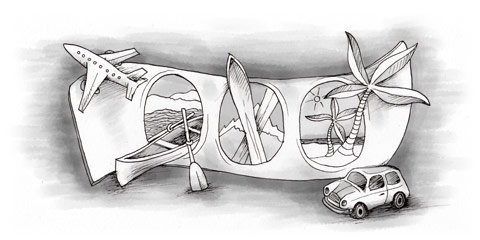Perhaps for this reason, the French aren’t generally prejudiced against bikers, as motorists are in many other countries. Nevertheless, motorcycling is a dangerous pursuit: over 20 per cent of road casualties are motorcyclists and, over the same distance, a motorcyclist is 14 times as likely to have an accident than a car driver (although one has to wonder whether this is due to intrinsic dangers of motorcycle riding or to the way most motorcyclists flout the rules of the road ...)
Some rules apply to all motorcycles (collectively known as deux-roues); others apply to certain types of motorcycle only. Speed limits for all motorcycles are the same as for cars – although you wouldn’t think so. Third party insurance is always necessary, as well as passenger insurance. All bikes must also be registered, have registration plates and carry a nationality sticker ( plaque de nationalité).
Approved crash helmets must be worn by all motorcycle riders and passengers. Motorcycles above 50cc are permitted to use motorways (tolls are lower than for cars, although the cost of a long journey can still be considerable). Dipped headlamps must be used at all times by riders of motorcycles over 125cc (see also below).
When parking a bike in a city, lock it securely and if possible chain it to an immovable object. Take extra care when parking in a public place overnight, particularly in Paris, where bike theft is rife.
Mopeds
From the age of 14, children can ride a moped (variously known as a cyclomoteur, scooter, vélomoteur or Mobylette, the last being a trade name) with an engine capacity below 50cc capable of a maximum speed of 45kph (28mph) – despite the contorsions of riders attempting to eke an extra kph or two from their machines.
Mopeds must be registered and riders without a full licence must take a test ( brevet de sécurité routière/BSR) consisting of a theory paper ( attestation scolaire de sécurité routière/ ASSR1), taken at school, and five hours of practical training, four and a half of which must be on public roads, with a driving school (at a cost of around €75). Third-party insurance is necessary, and a metal tab with the owner’s name ( plaque de nom) must be attached to the handlebars.
Mopeds aren’t permitted on motorways, and riders must use cycle paths where provided. Two-stroke petrol ( mélange deux-temps) is available at most petrol stations, although an electric version of the classic Solex (last manufactured in the 1980s, although imitations are still built), known as the E-solex, may be available in the near future.
Mopeds can be lethal in the wrong hands (most teenagers have as much road sense as hedgehogs and rabbits) and hundreds are killed each year. If you have a child with a moped, it’s important to impress upon him the need to take care (particularly in winter) and not take unnecessary risks, e.g. always observe traffic signs and signal before making manoeuvres.
Other Motorbikes
Sixteen-year-olds can ride a motorcycle of up to 125cc (officially known as a moto légère), for which they require a licence A1. The requisite theory test, the ASSR2, can be taken at school. Eighteen-year-olds can begin ‘progessive training’ ( formation progressive) for a full motorcycle ( motocyclette or moto) licence ( A), although they’re limited to bikes below 34 horsepower until the age of 21.
If you aren’t at school, you can take an attestation de sécurité routière ( ASR), which takes the place of the ASSR1 and 2, through an adult education provider such as GRETA. A car licence ( B) entitles you to ride a motorcycle of up to 125cc, provided you’ve been driving for at least two years (although you must retake the theory exam if you’ve held a licence for more than five years without riding a motorcycle). However, it’s recommended that you take a course of riding lessons with a moto-école, which costs around €300.
Motorbike tours
France has a beautiful countryside and is a great country for motorbike travelling. Why not experience crossing Europe on a motorbike tour with people that share your passion? Make the best out of your time living away from home!


